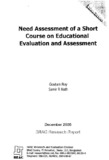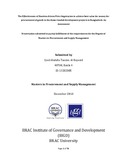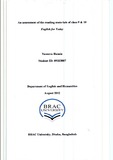| dc.contributor.advisor | Amin, Md Al | |
| dc.contributor.author | Mitul, Ummy Fahmida | |
| dc.date.accessioned | 2024-06-10T05:11:06Z | |
| dc.date.available | 2024-06-10T05:11:06Z | |
| dc.date.copyright | ©2023 | |
| dc.date.issued | 2023-05 | |
| dc.identifier.other | ID 21263007 | |
| dc.identifier.uri | http://hdl.handle.net/10361/23299 | |
| dc.description | This thesis is submitted in partial fulfillment of the requirements for the degree of Masters of Arts in English, 2023. | en_US |
| dc.description | Cataloged from PDF version of thesis. | |
| dc.description | Includes bibliographical references (pages 48-52). | |
| dc.description.abstract | Educational Assessment has immense impact on students‟ academic lives and careers. In the higher educational scenario, assessment determines the potentiality and required skills of the graduates. In the context of Bangladesh, students and teachers are mostly dependent on traditional pen and paper examination. Apart from traditional examination, a wide range of non-conventional assessment techniques can be applied to assess the students holistically. This study aims to explore the assessment practice in the higher education from students‟ and teachers‟ perspectives. I employed qualitative method to provide insights into the phenomena. The participants of this study were16 students and 4 teachers from different disciplines of a private university in Dhaka. In order to conduct the research, the participants were interviewed face to face through semi structured interview and the interview data has been presented thematically. The findings of the study revealed that the students and teachers have positive attitude towards alternative assessment methods. Alternative assessment methods develop their critical thinking skill, promote collaborative learning, facilitate students empowerment and less stressful as mentioned by the participants. Conversely, the participants pointed out some difficulties with these forms of assessment system including unfamiliar and new method, misuse of technology, time consuming, unethical act by the students, procrastination and so on. Moreover, the results indicated that virtual teaching learning and online assessment methods in the time of COVID 19 lockdown taught many lessons which lead to a transition from traditional pen and paper based examination to various kinds of alternative methods. | en_US |
| dc.description.statementofresponsibility | Ummy Fahmida Mitul | |
| dc.format.extent | 61 pages | |
| dc.language.iso | en | en_US |
| dc.publisher | Brac University | en_US |
| dc.rights | Brac University theses are protected by copyright. They may be viewed from this source for any purpose, but reproduction or distribution in any format is prohibited without written permission. | |
| dc.subject | Shifts in assessment practice | en_US |
| dc.subject | COVID-19 | en_US |
| dc.subject | Higher education | en_US |
| dc.subject | Traditional assessment | en_US |
| dc.subject | Alternative assessment | en_US |
| dc.subject | Educational assessment | en_US |
| dc.subject.lcsh | Educational accountability | |
| dc.subject.lcsh | COVID-19 Pandemic, 2020--Influence | |
| dc.subject.lcsh | Educational tests and measurements | |
| dc.subject.lcsh | Distance education | |
| dc.title | Shifts in assessment in higher education: students’ and teachers’ perceptions | en_US |
| dc.type | Thesis | en_US |
| dc.contributor.department | Department of English and Humanities, Brac University | |
| dc.description.degree | M. in English | |




